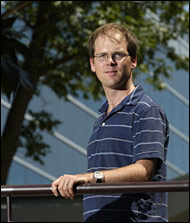Posted Sep. 1/05
The words first emerged from Prime Minister Paul Martin’s lips during his first major policy speech as a Liberal leadership contender in 2002.
“Unfortunately, the authority of individual Members of Parliament has been allowed to erode, while power of the executive … grows,” he told a Toronto crowd. “It’s who you know in the PMO (Prime Minister’s Office) … We must move to address this democratic deficit.”
To reverse this trend, Martin proposed to allow MPs more opportunities to vote freely without toeing the party line, a higher level of independence for parliamentary committees, and an independent ethics commissioner.
Only then would the system become more democratic, Martin said at the time.

- Political Science Professor Jonathan Malloy
Fast forward to today and a democratic deficit remains, says Political Science Professor Jonathan Malloy. Even in the wake of the Gomery Commission’s proceedings, which looked into the federal government’s questionable ties to Liberal-friendly advertising firms in Quebec, nothing has moved in the areas of ministerial responsibility and public service ethics, he says.
“It’s not that the government doesn’t value (democracy). It’s just part of the big clogged agenda, which is also paralyzed by the minority government.”
Throughout Martin’s term, there have been some symbolic attempts to make backbenchers feel more engaged, but these gestures were undercut when rookie MP Belinda Stronach defected from the Conservatives to join the governing Liberals, says Eileen Saunders, director of Carleton’s Arthur Kroeger College of Public Affairs.

- Eileen Saunders, director of Carleton’s Arthur Kroeger College of Public Affairs
The fact that Stronach was instantly appointed Minister of Human Resources likely weakened any sense of engagement felt by backbenchers, she adds.
One measure which may alleviate such sentiments is to give backbenchers and other members of Parliamentary committees more autonomy, as recommended by Martin. This might translate into more freedom to go after the things they want to investigate, says Malloy.
But others caution that if committees are given more power, the Canadian system could further resemble that of the U.S.
“I don’t accept that Parliament isn’t democratic” in its current form, says Former Deputy Prime Minister John Manley, BA/71. “I just don’t buy that. I think our Parliamentary system has worked quite well, and to Americanize it is not the best way to improve. We don’t need to turn committees into places where MPs get to flex their muscles and overturn the intentions of government just for the sake of doing it. To me, that’s not productive.”
What is more productive is for committee members to write thoughtful, detailed policy reports that give Cabinet insightful advice on which direction to take, adds Manley.
“Over the years, I’ve seen many cases where … committees
have done significant work and changed the direction of policy,” he says, pointing to one case when he was an opposition MP who chaired a committee that reviewed the mandate and role of the Bank of Canada. In the end, the government took the committee’s advice.
To ensure MPs continue to conduct meaningful committee work, Manley says Parliament should allow members to stay on committees for a longer period of time, with fewer committee assignments. Only then, he says, will MPs have a greater chance to build their expertise and make more meaningful contributions.
Another way to ensure MPs remain engaged is for the public to keep informed on all of their activities, says Malloy.
“MPs don’t spend a lot of time poring over government reports and statements because they know there’s absolutely no electoral value in it. They might say, ‘We put out these committee reports all the time, but no one reads them. So why should we bother?’ So the public should ask more from MPs by asking them to spend more time doing these (committee) tasks, even if they are dull, technical and picky.”
Next: Getting out to vote